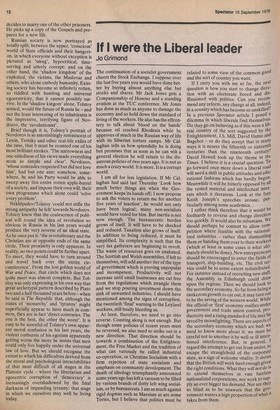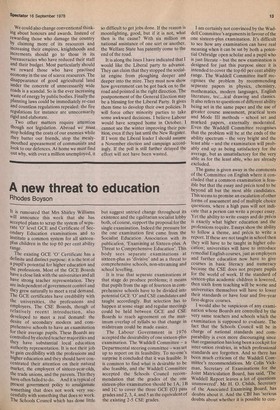If I were the Liberal leader
Jo Grimond
The continuation of a socialist government cheers the Stock Exchange. I suppose over the last five years you would have done better by buying almost anything else but stocks and shares. Mr Jack Jones gets a Companionship of Honour and a standing ovation at the TUC conference. Mr Jones has done as much as anyone to damage the economy and so hold down the standard of living of the workers. He also has the effrontery to talk about 'blood on the hands' because oil reached Rhodesia while he approves of much in the Russian way of life with its Siberian torture camps. Mr Callaghan tells us how splendidly he is doing but promises that as soon as he can win a general election he will return to the disastrous policies of two years ago. It is not so much a crazy world. It is more. It is a corrupt world.
I am all for less legislation. If Mr Callaghan had said last Thursday 'Look how much better things are when the Government keeps its hands off; I now propose to ask the voters to return me for another five years of inaction', he would not only have been logical; many non-socialists would have voted for him. But inertia is not now enough. The bureaucratic burden grows of itself. It will have to be checked and reduced. Taxation also grows of itself. In addition to being reduced, it must be simplified. Its complexity is such that the very tax gatherers are beginning to revolt. The waste of resources goes on unabated. The Scottish and Welsh assemblies, if left to themselves, will add another tier of the type of government which is proving unpopular and incompetent. Productivity will not increase until small businesses are cut free from the regulations which strangle them and we stop pouring investment down the sink of unwanted industries. I should have mentioned among the signs of corruption, the twentieth 'final' warning to the Leyland workers, still busily bleeding us.
At least, therefore, we need to go into reverse. Coasting along is not enough. But though some policies of recent years must be reversed, we also need to strike out in a new direction. That direction should be towards a combination of the Enlighten ment, the Free Market and the tradition of what can variously be called industrial co-operation, or Christian Socialism with a firm rejection of state socialism and emphasis on community development. The death of ideology triumphantly announced some years ago has left a vacuum to be filled by various brands of dotty left wing socialism, or by bureaucrats. I am as much against rigid dogmas such as Marxism as are some Tories, but I believe that politics must be related to some view of the common good and the sort of country you want. If I carry you with me so far, the next question is how you start to change direction with an electorate bored and disillusioned with politics. Can you recommend any reform, any change at all, indeed, in a country which has become so unskilled? In a previous Spectator article I posed a dilemma in which liberals find themselves. Do they go on behaving as if this were a liberal country of the sort suggested by the Enlightenment, J.S. Mill, David Hume and Bagehot — or do they accept that in manY ways it is nearer the fifteenth or sixteenth centuries than the nineteenth century? David Howell took up the theme in the Times. I believe it is a crucial question. To go forward once more down a liberal road will need a shift in public attitudes and edu cational fashions which has hardly begun. Meanwhile it will be bitterly opposed by all the vested material and intellectual inter ests which it threatens. Look at the fury Keith Joseph's speeches arouse, Particularly among some academics., I rather think therefore that it would be foolhardy to reverse and change direction too quickly. It would also be inhumane. we should perhaps be content to allow competition where feasible with the national ized industries — rather than dismantling them or handing them over to their workers (which at least in some cases is what Wu mately should be done), New entrepreneurs should be encouraged to enter the fields of transport, ship-building, etc. The civil ser vice could be to some extent redistributed. For instance instead of recruiting new staff, the Assembly in Edinburgh could draw upon the regions. Then we should look to the secondary economy. So far from being 3 cankerous growth to cut out, it may turn out to be the saving of the western world. While the official or 'first' economy ossifies under government and trade union control, pro ductivity and a rising standard of life may be saved by moonlighting. There are aspects of the secondary economy which are bad: we need to know more about it: we must be careful not to smother it by well or ill intentioned interference. But, in general, I regard the attempt to get out from under. to escape the stranglehold of the corporate state, as a sign of welcome vitality. It shows that the British will work hard enough give!) the right conditions. What they will not do is to extend themselves in vast faceless nationalized corporations, nor work to suPply an ever bigger tax demand. Nor are they so blind as to be unaware that the goy,ernment wastes a high proportion of what it takes from them. We could also change conventional thinking about honours and awards. Instead of rewarding those who damage the country by claiming more of its resources and increasing their empires, knighthoods and increments should go to those in its bureaucracies who have reduced their staff and their budget. Most particularly should we reward those who have practised economy in the use of scarce resources. The disappearance of good agricultural land under the concrete of unnecessarily wide roads is a scandal. So is the ever increasing waste of energy by public bodies. Finally the Planning laws could be immediately re-cast and countless regulations repealed: the fire regulations for instance are unnecessarily rigid and elaborate.
Two other matters require attention though not legislation. Abroad we must stop holding the coats of our enemies while they batter our friends, stop the mealymouthed appeasement of communists and look to our defences. At home we must find out why, with over a million unemployed, it so difficult to get jobs done. If the reason is moonlighting, good, but if it is not, what then is the cause? With six million on national assistance of one sort or another, the Welfare State has patently come to the end of the road.
It is along the lines I have indicated that I would like the Liberal party to advance. They can claim that they stopped the socialist engine from ploughing deeper and deeper into the mire. They must now show how government can be got back on to the road and pointed in the right direction. The postponement of the General Election may be a blessing for the Liberal Party. It gives them time to develop their own policies. It will force other minority parties to take some awkward decisions. I believe Labour would have scraped home in October. I cannot see the winter improving their position, even if they last until the New Register. If I were the Liberal leader I should assume a November election and campaign accordingly. If the poll is still further delayed the effort will not have been wasted.



































 Previous page
Previous page